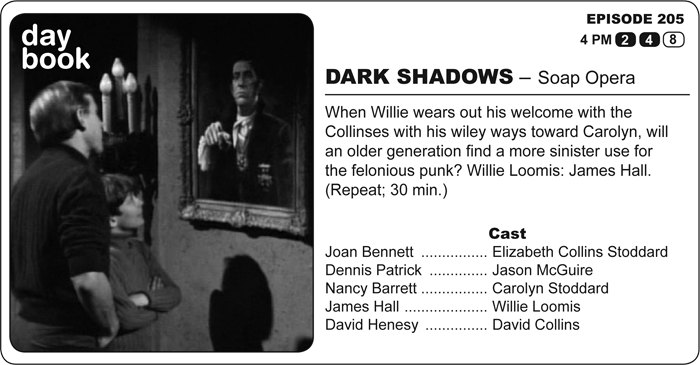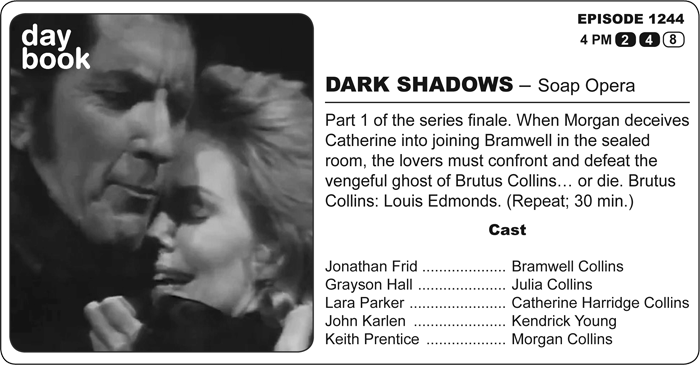
By PATRICK McCRAY
Taped on this day in 1971: Episode 1244
Series Finale. Part One: When Catherine is tricked into joining Bramwell in the haunted room, what will stop Morgan Collins? Catherine Collins: Lara Parker. (Repeat; 30 min.)
Catherine finds herself in the secret room, where Bramwell prevents her suicide by sharing the willpower to defy the possessing ghost of Brutus. When Morgan realizes they may still live, he loads his flintlock, determined to see that they don’t.
The second-to-last Dark Shadows episode. In some ways, it's a more powerful notion than the last. Because with this, there is still an opportunity for something else. One more twist, turn, revelation, development, etc. Viewers knew where it fell in the broadcast order. Watching it was not a process of seeing things for the last time, desperately scribbling mental notes in the diary we keep with us always, Cecily.
There is a rare privilege in second-to-last that way, and it courses through the episode. It has risk and bravado. It is not a resolution of declining actions. It is not the echo of Gordon Russell's typewriter gone cold. It is a 24 minute-long bang of an exclamation point hammering onto a page at 500 frames a second. Nothing is over until Sam Frickin' "God" Hall says it's over, and there is still a future to this.
From a maybe-spooky house filled with the failure of love to a violently haunted room endured by the truth of it, Dark Shadows tears down the freeway of storytelling, inverting Art Wallace's vision, and by exploring its antithesis, fulfills it. No more questions. No more things to not understand, Vicki. Morgan Collins is the ugliness of Liz's homicidal rage and Roger's sociopathic indifference stripped of the necessary glamor of having to star in tomorrow's episode. Ultimately, Liz and Roger are not forgivable. We've only been bullied into forgiving them by winning performances and unlikely changes of heart. Morgan Collins, as we learn, was not driven mad by Brutus nor given any other excused absence from morality. He's a terrible human, and as Dark Shadows slips from the airwaves, it's not going to vanish while giving a moral sanction to that cretin.
Let me qualify this, and follow me to the end of the paragraph. I don't give two hoots about women's issues. Absolutely none. I have plenty of issues of my own before I even contemplate another gender… if gender even exists and I get a headache this big contemplating it. But I am still a human, and I don’t like to see people ruin their lives for unchallenged reasons. So believe me when I say that even I am on fire in the best sense over the intoxicating politics in this episode. Much of the strength of this episode is as a reinforcement for female audience members, trapped at home at four o’-something in the afternoon, to say, "Absolutely not.”
It’s about damned time.
It’s practically drawing a map to escape the socially acceptable Morgans who have trapped them into powerless lives of reproductive obligation and ham cookin’. To me, Bramwell and Catherine are equally powerful allies in fighting the Room 1408 of Collinwood. The whole maghilla set into motion by Brutus' entitled ownership of Amanda is picked up by Morgan and then undone by Catherine and Bramwell. It may take the fear and pressure of a haunted room for them to insist on the other living, but they do so.
Breaking it down -- Bramwell, holding the fuzzy end of the economic lollipop, is not the apparently attractive suitor. But he's the right one. Catherine, subject to the pressures of the age, makes a sadly understandable choice, but she reverses it passionately. And Bramwell is there for her.
It has to be Jonathan Frid and Lara Parker. The argument about whether or not the series is about them is ended with this episode. Don’t look at the jury. They’re at the Blue Whale, job well done. Upon whom does the end of the DS saga rely? Yeah, the most important characters at the end, making the pivotal choices... and the character names don’t really matter.
The end of the Barnabas/Angelique story wasn't in 1840. It's here. Yes, okay, it kind of ended in 1840, but this is the test, in a spiritual sense. Follow me. Invert everything to see if you get the same results. Make Bramwell the poor one. Make Catherine the one who follows propriety. It's even Bramwell's fellow Collins who is the villain. But unlike Jeremiah, a victim of a love spell, Morgan is an agent of action, conducting himself with a perverse sense of deliberate clarity. By reversing the roles, we see if the lessons leading up to the 1840 resolution will stick in the most metaphysical sense.
They do.
That's why 1841PT is the proper end to the series. That's how it fits in. If the strength of love is strong enough, it will hold true. No matter the social expectations. No matter the century. No matter how parallel the band of time. No matter the names of the characters.
Never said it was easy.
Liz lacked it. Roger lacked it. Barnabas and Angelique earned it. Bramwell and Catherine made sure it was here to stay.
Gordon Russell ends his final script with proper disrespect for traditional expectations of marriage and social class. Not just for female audience members, but for the kids still watching, as well. Uncles Sam and Gordon could only provide a safe place for a half-hour a day. For many, there was a far more twisted vision of home unspooling the other twenty-three-point-five. Not for all of them, no. But the message was there for the right ones. And the rest got a damned good story.
And that's an issue even I can get behind.
This episode hit the airwaves on April 1, 1971.


